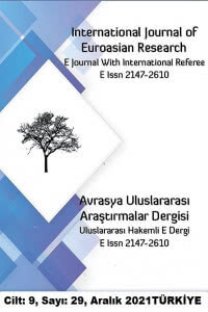CONCEPTS AND CATEGORIES USED IN SOVIET PROPAGANDA ANIMATED FILMS
Öz In this research, the codes produced by the Soviet animation cinema, operating for nearly seventy years and showing the consequences and reflections of the political ideology it is involved in as the product of a systematic mechanism, have been determined. In line with the conclusions, it has been examined that these animated films form a kind of cultural memory that reflects the political history and social culture of the Soviets. The content analysis method proposed by Juliet Corbin and Anselm Strauss for the analysis of qualitative data was used in the article. This method aims to gather and interpret similar data within the framework of specific concepts and categories. Content analysis was created in four stages: a) coding of data, b) finding categories, c) organizing codes and categories, d) defining and interpreting findings. If a structure is formed in line with the decisions, it is perceived that two separate groups are created as ‘we’ and ‘they’ in the films analyzed, and the expression ‘they’ is based on two elements: anti-Westernism built in the context of capitalism and imperialism, and anti-Nazism within the connection of fascism. The expression ‘we’ is based on bringing socialism and communism to the forefront, spreading and rooting them. In this connection, it has been noticed that the films used as data can be combined under three main titles: ‘Anti-Capitalist and AntiImperialist Films’, ‘Anti-Fascist Films’, and ‘Films with Praise for Socialism and Communism’. After considering all the findings and inferences made, it was comprehended that the animated films were documents that exhibit the period in which they were described or referenced. From this point of view, it can be assumed that the propaganda actions carried out by the Soviet Union not only ensure the development and persistence of existing political ideas and ideologies but also found a cultural memory in the society.
___
BENDAZZI, Giannalberto, (1995), Cartoons: One Hundred Years of Cinema Animation, Indiana University Press.
BORSTEN, Joan, (Director), (1997), The Animated Soviet Propaganda: From the October Revolution to Perestroika [DVD].
EISENSTEIN, Sergei, (1982), Film Essays and a Lecture, New Jersey: Princeton University Press.
